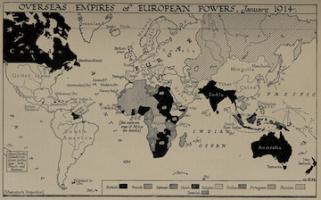The mass deaths along the Mediterranean are part of a much longer colonial history of maritime security aimed at protecting the freedom of (European) mobility.
“In the past two decades, it is estimated that 20,000 people have died in the Mediterranean while trying to reach Europe from North Africa and the Middle East.”
In this series, we ask acclaimed authors to answer five questions about their book. This week’s featured author is Renisa Mawani. Mawani is Professor of Sociology at the University of British Columbia. Her book isAcross Oceans of Law: The Komagata Maru and Jurisdiction in the Time of Empire.
Roberto Sirvent:How can your book help BAR readers understand the current political and social climate?
Renisa Mawani: Across Oceans of Law follows a single ship – the Komagata Maru– through time and space, across oceans and historical periods. Although the book is set in the late nineteenth and early twentieth centuries, it is very much a reflection on present conditions, especially the intensifying regimes of racial and colonial violence directed at men, women, and children along the Mediterranean Sea. Oceans have been central to migration patterns and to border control practices. Yet, they have received little scholarly attention in studies of migration. Not all migrant routes are maritime routes. However, the current “migrant crisis” is indeed unfolding along the Mediterranean Sea.
In the past two decades, it is estimated that 20,000 people have died in the Mediterranean while trying to reach Europe from North Africa and the Middle East. According to the Missing Migrants Project, 2,749 migrant deaths were reported in 2017 alone. In the book, I argue that these contemporary conditions of seaborne violence must be situated historically within jurisdictional struggles over land, sea, and territorial waters, lines that were legally formalized in the early seventeenth century with the writings of Dutch jurist Hugo Grotius. One of the book’s primary objectives is to critically examine the European myth of the “free sea,” how subaltern seafarers challenged this doctrine, to what effect, and at what cost. The deaths along the Mediterranean, as I read them, are part of a much longer colonial history of maritime security aimed at protecting the freedom of (European) mobility.
What do you hope activists and community organizers will take away from reading your book?
The main takeaway I hope for activists, community organizers, and scholars is the overlapping and shared histories produced by British imperial and colonial rule. In the book, I approach oceans not as watery surfaces of the planet but as spaces to think with. Drawing on what I term “oceans as method,” I trace historical connections between the Pacific, Atlantic, and Indian Oceans, and the Mediterranean Sea through the movements of a single ship. I am especially attentive to how the voyage engendered changes in colonial law while also producing a flourishing Indian radicalism. Throughout, I use currents as metaphor and materiality, as a way to join ocean arenas and their respective histories of racial and colonial violence. Currents, as oceanographers have argued, are vertical, horizontal, and circuitous forces that mark the surface and the depths of the seas. They connect regions that have long been divided in European thought.
Across Oceans of Law offers a way to think through multiple histories of racial and colonial violence including transatlantic slavery, Indigenous dispossession, Indian and Chinese indenture, and what the British Empire called “free” migration. But it also has ethical and political ambitions. What I hope readers will take away from these multiple movements and connected histories is new ways to imagine spaces of empire and the complicities and solidarities they produced. One of the things that continually amazed me as I did research for the book is the awareness that Indians in India and the diaspora expressed of British colonial pursuits in other times and places. Some were familiar with transatlantic slavery while others were attentive to ongoing efforts to deterritorialize Indigenous peoples in Canada, Australia, and South Africa. Still others were able to connect the planetary dots between these repertoires of racial and colonial violence, and in ways that remain difficult for us today.
We know readers will learn a lot from your book, but what do you hope readers will un-learn? In other words, is there a particular ideology you’re hoping to dismantle?
I really like this question. It reminds me that reading and writing are not only processes of learning but active processes of unlearning as well.
Across Oceans of Law is intended to tell a global and maritime history of a ship that has largely been written of in terms of landfall and arrival, Canadian racism and nationalism. Repositioning land and sea and connecting ocean regions, the book is a direct challenge to what Marcus Rediker calls “terracentrism.” So much of our thinking on law, colonialism, imperialism, and decolonization focuses on land, sovereignty, and territoriality. To be sure, these questions are key to Indigenous struggles and to Indigenous and non-Indigenous efforts to decolonize the planet. But oceans, rivers, and other watery regions need to feature more prominently in these discussions. Water has gained a greater visibility, as Standing Rock and Adivasi struggles in India attest to. But those of us concerned with decolonization need to remember that land and sea were both spaces of European colonization and control.
In this sense, the book is also a confrontation with the European cartographer’s map. Specifically, it aims to problematize the seemingly natural divisions between latitude/ longitude and time/ space by demonstrating how these global lines remain the calcified effects of colonial and imperial rule. There is now a growing and flourishing literature on space and colonialism. However, the scholarship on time and colonialism is far less robust. Oceans and ship navigation, I argue in the book, were central to the development and imposition of a global time, one that continues to govern our lives in powerful ways that are difficult to resist and that often escape scrutiny.
Who are the intellectual heroes that inspire your work?
In writing Across Oceans of Law, I’ve drawn a great deal of inspiration from poetry and literature. The work of Caribbean writers, including Derek Walcott, Edouard Glissant, Fred D’Aguiar, and M. NourbeSe Philip has been especially formative as I’ve thought through oceans and the ships that crossed them. As I began writing the book, I quickly learned that a legal history of shipping and the sea could not be written without centering transatlantic slavery. The work of Saidiya Hartman, Christina Sharpe, and Stephanie Smallwood has also been vital. Amitav Ghosh’s Sea of Poppies left a lasting impression from early on. I read Sea of Poppies when it was first published, and have read it and taught it many times since. The maritime, colonial, and imperial worlds that Ghosh so vividly sketches out, and invites us into, have been very generative to my thinking and writing.
My intellectual heroes also include those minor figures of history. I’ve grown very fond of the protagonists in the book, especially Gurdit Singh and Husain Rahim. Although Gurdit Singh chartered the Komagata Maru, he was not a trained mariner. He was a railway contractor and an alleged rubber planter who lived between Singapore and Malaya. Husain Rahim worked as a cotton merchant in Kobe and arrived in Vancouver in 1909. Both men had grand visions of an India and an Indian diaspora that was unmoored from British imperial rule. Singh’s ambition was to start a shipping company that would lead India to independence. Rahim’s was to ensure that all women and men coming to Canada from India would be allowed to land lawfully. Over the years, their courage and determination has been a source of strength and admiration.
In what way does your book help us imagine new worlds?
The men I write about held expansive anticolonial imaginaries that challenged the spatial and temporal divisions inscribed into European maps while also disputing the directionalities of history. In a trenchant critique of the British and Indian colonial governments, Gurdit Singh sutured together transatlantic slavery, Indian indentured labor in the Straits Settlements, and Indian migrationto Canada and Australia. In so doing, he recast space and time in ways that undermined prevailing distinctions between land and sea and the forward march of history. Although Singh recognized that oceans were sites of colonial and imperial power, he equally appreciated how ocean regions joined distant parts of the earth and generated different conceptions of past and future. It was in the interstices of land and sea, time and space that he envisioned the potential for freedom.
In many ways, Singh’s writings provide an alternative map, vision, and imaginary which was as critical then as it is now. Land and sea are not separate or distinct but are part of a much larger planetary whole and a wider scene of racial, colonial, and anticolonial struggle. Singh’s writings – notwithstanding his many blindspots and omissions – invite other ways of seeing the world anew.
Roberto Sirventis Professor of Political and Social Ethics at Hope International University in Fullerton, CA. He also serves as the Outreach and Mentoring Coordinator for thePolitical Theology Network. He is co-author, with fellow BAR contributor Danny Haiphong, of the new book,American Exceptionalism and American Innocence: A People’s History of Fake News—From the Revolutionary War to the War on Terror.
COMMENTS?
Please join the conversation on Black Agenda Report's Facebook page at http://facebook.com/blackagendareport
Or, you can comment by emailing us at comments@blackagendareport.com


















